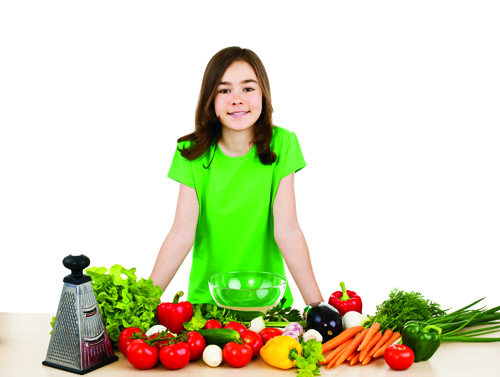

<p><img class=" alignright size-full wp-image-120" style="margin: 5px; float: right;" src="http://schoolnewsnz.fastrackdev.com/wp-content/uploads/2011/10/SN11_-_Food__Beverage_-_5__A_Day_-_9971686.jpg" alt="SN11 - Food Beverage - 5 A Day - 9971686" width="253" height="191" />The 5+ A Day message, widely embraced by early childhood and primary school children, is now being taken to pre-teens, in an effort to target older children.</p>
<p> <!--more--> </p>
<p>The healthy eating message has been extremely successful in New Zealand with 93 per cent of primary school children not only understanding what the 5+ A Day message means but around 90 per cent of them also reporting they have fruit in their lunchboxes.</p>
<p>Now, for the first time, the 5+ A Day team are targeting intermediate schools around the country in an effort to get pre-teens eating five or more servings of fruit and vegetables every day. The new 5+ A Day Fruit and Vegetable Food Technology Resource will be sent out to all year 7 and 8 food technology teachers nationwide.</p>
<p>The resource provides the students with <a class="wpil_keyword_link" href="https://www.schoolnews.co.nz/2015/10/developing-opportunities-at-school-with-a-view/" title="opportunities" data-wpil-keyword-link="linked" target="_blank">opportunities</a> to cook practical and popular 5+ A Day recipes including tasty stuffed baked potatoes and roast vegetable salads. The resource encourages recipe development, cooking skills and theoretical knowledge.</p>
<p>Bronwen Anderson, former CEO of the Nutrition Foundation and spokesperson for 5+ A Day, says it is really important for older children to get their daily dose of vitamins and minerals as their bodies are growing at a faster rate than ever before.</p>
<p>&#8220;As New Zealand children move on to intermediate school there will be one thing that they won&#8217;t leave behind – and that is the 5+ A Day message,&#8221; she says.</p>
<p>She says some pre-teenagers will start to skip meals such as breakfast with the risk that they&#8217;ll top up at morning break with high fat, high sugar snacks instead of fruit and vegetables.</p>
<p>&#8220;Fruit and vegetables are full of vitamins and minerals that help grow healthy bodies, improve concentration and memory, enhance eyesight and build strong teeth. At this age, it&#8217;s more important than ever to get a daily dose of fruit and vegetables.</p>
<p>&#8220;Once children hit their teenage years and high school, the way we deliver the message needs to change, so we do that through music and those things that maintain the interest of young teens,&#8221; she says.</p>
<p>Deputy Director General of the European Commission, Lars Hoelgaard says improving the eating habits of children and adolescents is an important strategy for improving public health.</p>
<p>&#8220;Interventions targeting healthy nutrition need to occur in early childhood or during adolescence in order to prevent or reverse health effects of overweight and poor nutrition&#8230;schools are a critical part of the social environment that shapes young people&#8217;s behaviour.&#8221;</p>
<p>In classrooms around the country, children now learn about the history, value and trends in fruit and vegetables in New Zealand. The classroom resources include fun activities to encourage positive attitudes towards healthy food choices.</p>
<p>In addition, a further 100,000 school children from more than 470, decile 1 and 2 schools receive fresh produce daily as part of the nationwide Fruit in Schools Programme.</p>
<p>Funded by the Ministry of Health, the programme delivers one piece of fruit or vegetable every day, or nearly 20 million pieces of fruit and vegetables every year, to children at low decile schools.</p>
<p>The programme has had a profoundly positive effect on children&#8217;s health and well being. Anecdotal evidence shows a massive improvement in dental health, school sores and sick days being taken by children under the Fruit in Schools programme. And as an added benefit, 87 per cent of teachers reported children&#8217;s concentration in class had improved.</p>

NZEI Te Riu Roa is considering legal action against the government for the disestablishment of…
NZQA is implementing AI-marking for all Year 10 written assessments from this year onwards, following…
Teaching personal financial responsibility isn't enough. Children should be taught broader economic context, argue New…
When students can't hear the teacher, they can't learn properly. Sound quality matters in education…
The Garden City is rich with learning opportunities, no matter what subject or part of…
Teaching Council of Aotearoa launch school leaders’ stories project with Unteach Racism to challenge institutional…
This website uses cookies.